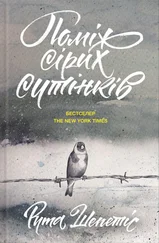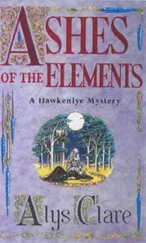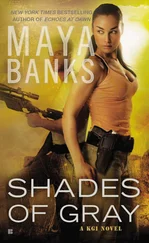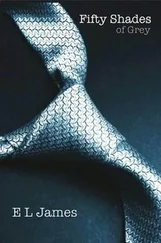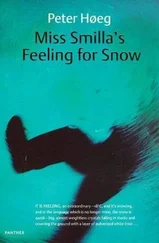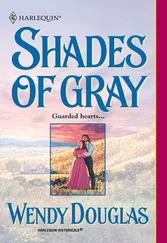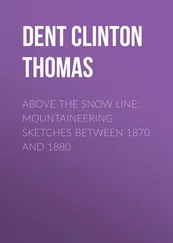“Mother, what’s happening?” said Jonas.
“They say we must report to the kolkhoz office immediately.”
“Davai!” shouted a guard holding a lantern. They became impatient. One drew a pistol.
“ Da! Yes!” said Mother. “Hurry, children! Move!” We scrambled out of our straw. Ulyushka rolled over, turning her back to us. I looked over to my suitcase, grateful I had hidden my drawings.
Others were also herded from their huts. We walked in a line down the dirt path toward the kolkhoz office. I heard the bald man yelling somewhere behind us.
They packed us into the main room of the log building. The gray-haired man who wound his watch stood in the corner. The little girl with the dolly waved excitedly to me, as if reunited with a long-lost friend. A wide bruise blossomed across her cheek. We were instructed to wait quietly until the others arrived.
The log walls were chinked with gray paste. At the head of the room, a desk with a black chair took up much of the floor. Portraits of Marx, Engels, Lenin, and Stalin hung above the desk.
Iosif Vissarionovich Dzhugashvili. He called himself Josef Stalin, which meant “Man of Steel.” I stared at the picture. He seemed to stare back. His right eyebrow arched, challenging me. I looked at his bushy mustache and dark, stony eyes. The portrait showed him almost smirking. Was that intentional? I wondered about the artists who painted Stalin. Were they grateful to be in his presence, or terrified of the outcome if he found their portraits unbecoming? The picture of Stalin was crooked.
The door opened. The bald man hobbled in on his broken leg.
“And not one of you thought to help me!” he yelled.
Komorov, the commander, marched in, followed by several NKVD carrying rifles. The blond guard, Kretzsky, was at the end of the line carrying a stack of papers. How did Andrius learn their names? I looked around for Andrius and his mother. They weren’t there.
Komorov began speaking. Everyone turned toward Mother. The commander paused and raised his eyebrow at her, twirling the ever-present toothpick on his tongue.
Mother’s face tightened. “He says we’ve been brought here for paperwork.”
“Paperwork?” said Mrs. Rimas. “At this hour?”
Komorov continued speaking. Kretzsky held up a typewritten document.
“We are all to sign that document,” said Mother.
“What does it say?” the crowd demanded.
“It says three things,” said Mother, staring at Komorov. He continued speaking, with Mother translating in between for the group.
“First, we sign that we agree to join this collective farm.” There were rumbles within the room. People turned back to the commander as he spoke. His arm casually moved his uniform aside, displaying the gun at his hip. The crowd shifted.
“Second,” said Mother, “we sign that we agree to pay a war tax of two hundred rubles per person, children included.”
“Where are we to get two hundred rubles?” said the bald man. “They’ve already stolen all that we had.”
Chattering ensued. An NKVD pounded the butt of his rifle on the desk. The room quieted.
I looked at Komorov as he spoke. He stared straight at Mother, as if he were deeply enjoying what he was saying to her. Mother paused. Her mouth sagged.
“Well, what is it? What’s the third, Elena?” said Mrs. Rimas.
“We agree that we are criminals.” Mother paused. “And that our sentence shall be… twenty-five years’ hard labor.”
Shouts and wails erupted in the small room. Someone began to hyperventilate. The crowd pushed forward toward the desk, arguing. The NKVD lifted their rifles, pointing them at us. My jaw unlatched. Twenty-five years? We were going to be imprisoned for twenty-five years? That meant I would be older than Mother when we were released. I reached out to Jonas to steady myself. He wasn’t there. He had collapsed at my feet.
I couldn’t pull a deep breath. The room began to fold in around me. I was sliding, tangled in panic’s undertow.
“SILENCE!” yelled a male voice. Everyone turned. It was the gray-haired man who wound his watch.
“Calm yourselves,” he said slowly. “We do no good by becoming hysterical. We can’t think clearly if we panic. It’s scaring the children.”
I looked at the little girl with the dolly. She clung to her mother’s dress, tears spilling onto her bruised face.
The man lowered his voice and spoke calmly. “We are intelligent, dignified people. That is why they have deported us. For those of you who don’t know me, my name is Alexandras Lukas. I am an attorney from Kaunas.” The crowd quieted. Mother and I helped Jonas to his feet.
The commander, Komorov, yelled from the desk at the front of the room.
“Mrs. Vilkas, please tell the commander that I am explaining the situation to our friends,” said Mr. Lukas. Mother translated. Kretzsky, the young blond guard, chewed his thumbnail.
“I’m not signing any document,” said Miss Grybas. “They made us sign a registration document at the teachers’ conference. Look where it got me. That’s how they collected the names of all the teachers to deport.”
“They’ll kill us if we don’t sign,” said the grouchy woman.
“I don’t believe so,” said the gray-haired man. “Not before winter. We are in the first week of August. There is much work to be done. We are good, strong workers. We are farming for them, building structures for them. It is to their benefit to use us, at least until winter comes.”
“He’s right,” said the bald man. “First they’ll grind us from grain to flour, then they’ll kill us. Who wants to wait around for that? Not me.”
“They shot the girl who had the baby,” huffed the grouchy woman.
“They shot Ona because she lost her senses,” said Mr. Lukas. “She was out of control. We are not out of control. We are intelligent, rational people.”
“So we shouldn’t sign?” someone asked.
“No. I believe we should sit down in an orderly manner. Mrs. Vilkas will explain that we are not ready to sign paperwork.”
“Not ready?” said Mrs. Rimas.
“I agree,” said Mother. “We must not completely refuse. And we must show that we are not hysterical. Form three lines.”
The NKVD held up their rifles, unsure what we might do. We sat down in straight lines in front of the desk, under portraits of Russia’s leaders. The guards looked at one another, dumbfounded. We sat calmly. We had regained a slice of dignity. I put my arm around Jonas.
“Mrs. Vilkas, please ask Commander Komorov what the charges are,” said the gray-haired man. Mother translated. Komorov sat on the edge of the desk, swinging his boot.
“He says we are charged under Article 58 of the Soviet Penal Code for counterrevolutionary activities against the USSR,” said Mother.
“That doesn’t carry a twenty-five-year sentence,” muttered the bald man.
“Tell him we will work for them and we will provide good labor, but we are not yet ready to sign,” said Mr. Lukas.
Mother translated. “He says we must sign now.”
“I am not signing a paper condemning me to twenty-five years,” said Miss Grybas.
“Nor am I,” I said.
“So what do we do?” asked Mrs. Rimas.
“We wait here quietly until we are dismissed,” said Mr. Lukas, winding his watch.
And so we waited.
“Where’s Andrius?” whispered Jonas.
“I don’t know,” I said. I had heard the bald man ask the same question.
We sat on the floor of the kolkhoz office. Every few minutes, Komorov would slap or kick someone, trying to bully them into signing. No one did. I winced with his every step. Sweat trickled across the nape of my neck and along my spine. I tried to keep my head down, afraid that Komorov would notice me. Those who fell asleep were beaten.
Читать дальше
![Рута Шепетис Ashes in the Snow [aka Between Shades of Gray] обложка книги](/books/414915/ruta-shepetis-ashes-in-the-snow-aka-between-shades-cover.webp)
